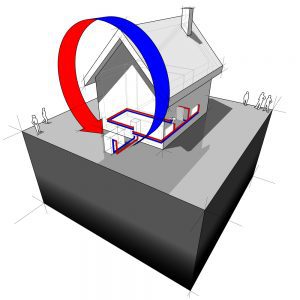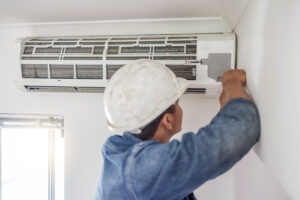Geothermal Heating Pros And Cons
Whether you’re building a new home or retrofitting an existing one, installing a new heating system is a sizeable investment, so it’s only natural that you want to consider your options carefully. Geothermal heating is one possibility that might be a bit unfamiliar, but it’s definitely worth a closer look. Exploring geothermal heating pros and cons is a great way to discover more about this efficient, eco-friendly form of heating.

Anyone who has experienced a steamy summer day or a cold winter night knows that air temperatures can bounce from one extreme to another. However, many people fail to realize that underground temperatures tend to be fairly stable. A geothermal heating system utilizes this consistency to keep your living space comfortable. It transfers heat energy between your home and the ground by using the earth as a heat sink in the summer and a heat source in the winter. Is geothermal right for you?
The Pros Of Geothermal Heating
While they may not be as common as more traditional heating systems, geothermal heating systems offer numerous advantages. Geothermal heating boasts all of the following attributes:
- Eco-Friendly: A renewable resource, geothermal energy is not a significant source of pollution. In fact, when compared to other heating and cooling sources, it produces the smallest carbon footprint.
- Efficient: With a geothermal system, you’re moving heat from one place to another. This process requires less energy than making new heat, so geothermal systems provide greater efficiency. As a result, you can expect savings of 30 percent to 60 percent on heating and 25 percent to 50 percent on cooling (source). As an added bonus, you won’t have to worry about cost fluctuations in gas or oil affecting your heating bill.
- Consistent: Geothermal systems will be there when you need them. Unlike solar and wind power, geothermal energy isn’t a weather-dependent resource. Regardless of the weather outside, these systems work throughout the year, and they can provide both heating and cooling.
- Reliable: Today’s geothermal systems are built to last. Indoor components typically have a lifespan of 25 years. The underground loop should last for 50 years or more. Plus, these hard-working systems have fewer moving parts than many other heating systems, so they require minimal maintenance.
- Unobtrusive: With no outdoor compressor or fan, geothermal systems are quiet. They’re also mostly underground, so once the installation is complete, they won’t present ugly obstacles for your landscaping.
- Versatile: Geothermal systems can be installed in new construction or replace another system in an existing structure. Not much land is needed, so a large yard is unnecessary. In fact, these systems can provide both heating and cooling for urban and rural spaces, and they can be used to promote comfort in everything from small houses to massive commercial spaces.
- Safe: Unlike heating systems that burn oil or gas to produce heat, geothermal systems use no combustion. That means that there’s no risk of carbon monoxide – a colorless, odorless, and potentially deadly gas – escaping from the system and causing problems.
The Cons Of Geothermal Heating
While installing a geothermal heating system can offer some significant perks, there are certain drawbacks that you should be aware of before opting for this technology. With geothermal heating, some people are troubled by the following:
- Initial Expense: Installing a geothermal system can be expensive. However, the higher upfront costs are offset by the system’s low operating costs. Tax cuts and other cost-reducing incentives may also be available.
- Use of Water: Some geothermal systems use wells, which can cause issues with the water table. Avoiding this complaint is as simple as opting for a closed-loop system, which doesn’t require additional water to function.
- Electrical Requirements: People who want to live totally off the grid are sometimes dismayed to learn that geothermal heating systems do require electricity to run. However, they use less electricity than other systems.
- Relative Rarity: At the moment, geothermal systems are outnumbered by more traditional heating systems. The pool of experienced contractors who install and service these systems is limited, but it’s growing.
Could geothermal technology provide the right heating and cooling system for you? Evaluating geothermal heating’s pros and cons is an important step in deciding whether this technology is a good fit for your comfort needs. While it’s not perfect, the many advantages that geothermal heating offers definitely make it an appealing option. At Long Heating and Cooling, we offer a wide range of heating and air conditioning services, including geothermal systems. We would be delighted to help you explore your options. Contact Long Heating and Cooling today to learn more about geothermal heating’s pros and cons and to request your free estimate.








